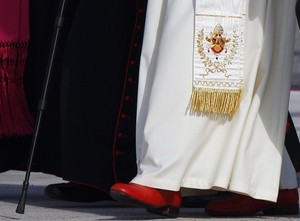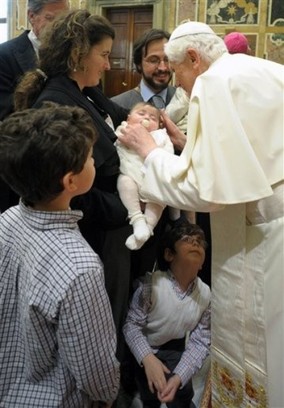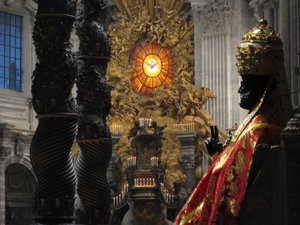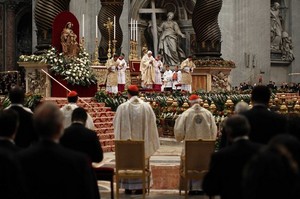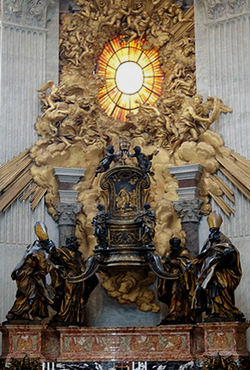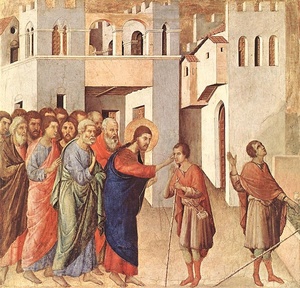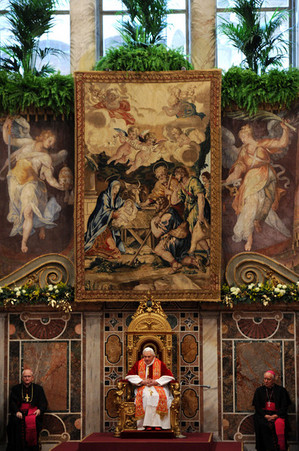Category: Pope Benedict XVI
Pope Benedict’s prayer intentions for March 2012
As Queen Esther asked God for grace to follow Him more closely, so we do the same….
The Pope asks us to join him during the month of March in praying for women and for those face the trial of discrimination.
The general intention
That the whole world may recognize the contribution of women to the development of society.
The mission intention
That the Holy Spirit may grant perseverance to those who suffer discrimination, persecution or death for the name of Christ, particularly in Asia.
Pope: faith is oriented towards love, reminds us; Mass with new cardinals
The Pope, as you know created 22 new cardinals yesterday. He gave them the symbols of office: the cardinal’s biretta, a new ring and the title of a church of which they are the “pastor of” in the Diocese of Rome. Today, the feast of the Chair of Saint Peter, the faithful gather around the Pope, the Bishop of Rome, to worship God. The Church celebrates the “throne of Truth”, a fitting image of Christ passing onto us a true experience of faith, truth and love. The homily given by Benedict XVI is noted below.
On this solemnity of the Chair of Saint Peter, we have the joy of gathering around the altar of the Lord together with the new Cardinals whom yesterday I incorporated into the College of Cardinals. It is to them, first of all, that I offer my cordial greetings and I thank Cardinal Fernando Filoni for the gracious words he has addressed to me in the name of all. I extend my greetings to the other Cardinals and all the Bishops present, as well as to the distinguished authorities, ambassadors, priests, religious and all the faithful who have come from different parts of the world for this happy occasion, which is marked by a particular character of universality.
In the second reading that we have just heard, Saint Peter exhorts the “elders” of the Church to be zealous pastors, attentive to the flock of Christ (cf. 1 Pet 5:1-2). These words are addressed in the first instance to you, my dear venerable brothers, who have already shown great merit among the people of God through your wise and generous pastoral ministry in demanding dioceses, or through presiding over the Dicasteries of the Roman Curia, or in your service to the Church through study and teaching. The new dignity that has been conferred upon you is intended to show appreciation for the faithful labour you have carried out in the Lord’s vineyard, to honour the communities and nations from which you come and which you represent so worthily in the Church, to invest you with new and more important ecclesial responsibilities and finally to ask of you an additional readiness to be of service to Christ and to the entire Christian community. This readiness to serve the Gospel is firmly founded upon the certitude of faith. We know that God is faithful to his promises and we await in hope the fulfilment of these words of Saint Peter: “And when the chief shepherd is manifested you will obtain the unfading crown of glory” (1 Pet 5:4).
Today’s Gospel passage presents Peter, under divine inspiration, expressing his own firm faith in Jesus as the Son of God and the promised Messiah. In response to this transparent profession of faith, which Peter makes in the name of the other Apostles as well, Christ reveals to him the mission he intends to entrust to him, namely that of being the “rock”, the visible foundation on which the entire spiritual edifice of the Church is built (cf. Mt 16:16-19). This new name of “rock” is not a reference to Peter’s personal character, but can be understood only on the basis of a deeper aspect, a mystery: through the office that Jesus confers upon him, Simon Peter will become something that, in terms of “flesh and blood”, he is not. The exegete Joachim Jeremias has shown that in the background, the symbolic language of “holy rock” is present. In this regard, it is helpful to consider a rabbinic text which states: “The Lord said, ‘How can I create the world, when these godless men will rise up in revolt against me?’ But when God saw that Abraham was to be born, he said, ‘Look, I have found a rock on which I can build and establish the world.’ Therefore he called Abraham a rock.” The prophet Isaiah makes reference to this when he calls upon the people to “look to the rock from which you were hewn … look to Abraham your father” (51:1-2). On account of his faith, Abraham, the father of believers, is seen as the rock that supports creation. Simon, the first to profess faith in Jesus as the Christ and the first witness of the resurrection, now, on the basis of his renewed faith, becomes the rock that is to prevail against the destructive forces of evil.
Dear brothers and sisters, this Gospel episode that has been proclaimed to us finds a further and more eloquent explanation in one of the most famous artistic treasures of this Vatican Basilica: the altar of the Chair. After passing through the magnificent central nave, and continuing past the transepts, the pilgrim arrives in the apse and sees before him an enormous bronze throne that seems to hover in mid air, but in reality is supported by the four statues of great Fathers of the Church from East and West. And above the throne, surrounded by triumphant angels suspended in the air, the glory of the Holy Spirit shines through the oval window. What does this sculptural composition say to us, this product of Bernini’s genius? It represents a vision of the essence of the Church and the place within the Church of the Petrine Magisterium.
The window of the apse opens the Church towards the outside, towards the whole of creation, while the image of the Holy Spirit in the form of a dove shows God as the source of light. But there is also another aspect to point out: the Church herself is like a window, the place where God draws near to us, where he comes towards our world. The Church does not exist for her own sake, she is not the point of arrival, but she has to point upwards, beyond herself, to the realms above. The Church is truly herself to the extent that she allows the Other, with a capital “O”, to shine through her – the One from whom she comes and to whom she leads. The Church is the place where God “reaches” us and where we “set off” towards him: she has the task of opening up, beyond itself, a world which tends to become enclosed within itself, the task of bringing to the world the light that comes from above, without which it would be uninhabitable.
The great bronze throne encloses a wooden chair from the ninth century, which was long thought to be Saint Peter’s own chair and was placed above this monumental altar because of its great symbolic value. It expresses the permanent presence of the Apostle in the Magisterium of his successors. Saint Peter’s chair, we could say, is the throne of truth which takes its origin from Christ’s commission after the confession at Caesarea Philippi. The magisterial chair also reminds us of the words spoken to Peter by the Lord during the Last Supper: “I have prayed for you that your faith may not fail; and when you have turned again, strengthen your brethren” (Lk 22:32).
The chair of Peter evokes another memory: the famous expression from Saint Ignatius of Antioch’s letter to the Romans, where he says of the Church of Rome that she “presides in charity” (Salutation, PG 5, 801). In truth, presiding in faith is inseparably linked to presiding in love. Faith without love would no longer be an authentic Christian faith. But the words of Saint Ignatius have another much more concrete implication: the word “charity”, in fact, was also used by the early Church to indicate the Eucharist. The Eucharist is the Sacramentum caritatis Christi [the sacrament of the love of Christ] through which Christ continues to draw us all to himself, as he did when raised up on the Cross (cf. Jn 12:32). Therefore, to “preside in charity” is to draw men and women into a eucharistic embrace – the embrace of Christ – which surpasses every barrier and every division, creating communion from all manner of differences. The Petrine ministry is therefore a primacy of love in the eucharistic sense, that is to say solicitude for the universal communion of the Church in Christ. And the Eucharist is the shape and the measure of this communion, a guarantee that it will remain faithful to the criterion of the tradition of the faith.
The great Chair is supported by the Fathers of the Church. The two Eastern masters, Saint John Chrysostom and Saint Athanasius, together with the Latins, Saint Ambrose and Saint Augustine, represent the whole of the tradition, and hence the richness of expression of the true faith of the one Church. This aspect of the altar teaches us that love rests upon faith. Love collapses if man no longer trusts in God and disobeys him. Everything in the Church rests upon faith: the sacraments, the liturgy, evangelization, charity. Likewise the law and the Church’s authority rest upon faith. The Church is not self-regulating, she does not determine her own structure but receives it from the word of God, to which she listens in faith as she seeks to understand it and to live it. Within the ecclesial community, the Fathers of the Church fulfil the function of guaranteeing fidelity to sacred Scripture. They ensure that the Church receives reliable and solid exegesis, capable of forming with the Chair of Peter a stable and consistent whole. The sacred Scriptures, authoritatively interpreted by the Magisterium in the light of the Fathers, shed light upon the Church’s journey through time, providing her with a stable foundation amid the vicissitudes of history.
After considering the various elements of the altar of the Chair, let us take a look at it in its entirety. We see that it is characterized by a twofold movement: ascending and descending. This is the reciprocity between faith and love. The Chair is placed in a prominent position in this place, because this is where Saint Peter’s tomb is located, but this too tends towards the love of God. Indeed, faith is oriented towards love. A selfish faith would be an unreal faith. Whoever believes in Jesus Christ and enters into the dynamic of love that finds its source in the Eucharist, discovers true joy and becomes capable in turn of living according to the logic of gift. True faith is illumined by love and leads towards love, leads on high, just as the altar of the Chair points upwards towards the luminous window, the glory of the Holy Spirit, which constitutes the true focus for the pilgrim’s gaze as he crosses the threshold of the Vatican Basilica. That window is given great prominence by the triumphant angels and the great golden rays, with a sense of overflowing fulness that expresses the richness of communion with God. God is not isolation, but glorious and joyful love, spreading outwards and radiant with light.
Dear brothers and sisters, the gift of this love has been entrusted to us, to every Christian. It is a gift to be passed on to others, through the witness of our lives. This is your task in particular, dear brother Cardinals: to bear witness to the joy of Christ’s love. We now entrust your ecclesial service to the Virgin Mary, who was present among the apostolic community as they gathered in prayer, waiting for the Holy Spirit (cf. Acts 1:14). May she, Mother of the Incarnate Word, protect the Church’s path, support the work of the pastors by her intercession and take under her mantle the entire College of Cardinals. Amen!
In the soil of our heart God first planted the root of love for him
Today, the Holy Father announced his Good Shepherd Sunday missive on vocations. Singed on 18 October 2011, Benedict wrote this letter for the 49th World Day of Prayer for Vocations that’s celebrated on the 4th Sunday of Easter, Good Shepherd Sunday. The Pope’s message is exactly what I was trying to teach to the RCIA people yesterday: God’s love is total and our love for Him needs to be an icon –that is, mirrored– to the world. His theme this year is: Vocations, the Gift of the Love of God. A few paragraphs of the text follow:
In a famous page of the Confessions, Saint Augustine
expresses with great force his discovery of God, supreme beauty and supreme
love, a God who was always close to him, and to whom he at last opened his mind
and heart to be transformed: “Late have I loved you, O Beauty ever
ancient, ever new, late have I loved you! You were within me, but I was
outside, and it was there that I searched for you. In my unloveliness I plunged
into the lovely things which you created. You were with me, but I was not with
you. Created things kept me from you; yet if they had not been in you they
would have not been at all. You called, you shouted, and you broke through my
deafness. You flashed, you shone, and you dispelled my blindness. You breathed
your fragrance on me; I drew in breath and now I pant for you. I have tasted
you, now I hunger and thirst for more. You touched me, and I burned for your
peace.” (X, 27.38). With these images, the Saint of Hippo seeks to
describe the ineffable mystery of his encounter with God, with God’s love that
transforms all of life.
Continue reading In the soil of our heart God first planted the root of love for him
Pope Benedict XVI’s monthly prayer intentions for February 2012
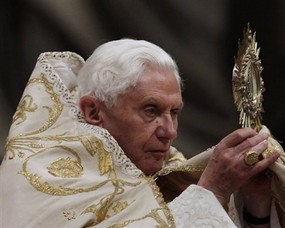 Praying with Pope Benedict XVI for the needs of the Church and people of good will, let’s raise our hearts to the Lord with the following:
Praying with Pope Benedict XVI for the needs of the Church and people of good will, let’s raise our hearts to the Lord with the following:
Pope shows us that “True authority is humble service in love”
The homilies and brief Angelus talks of the Pope really set the stage for what we ought to pay attention to in our spiritual life. His thinking is clear, and germane. Today is no different. How is it that we recognize and live within the authority of Jesus?
Jesus, on the Sabbath day, as he preached at the synagogue at Capernaum, the
small town where Peter and his brother Andrew lived on the lake of Galilee. In
his teaching, which arouses the wonder of the people, following the liberation
of “a man with an unclean spirit” (v. 23), who recognizes in Jesus as
the “saint of God,” that is, the Messiah. In a short time, his fame
spread throughout the region, which he travels announcing the Kingdom of God
and healing the sick of all kinds: word and deed. St. John Chrysostom observes
how the Lord “alternates the speech for the benefit of those who listen,
moving on from wonders to words and again passing from the teaching of his
doctrine to miracles” (Hom. on Matthew 25, 1: PG 57, 328).
Continue reading Pope shows us that “True authority is humble service in love”
The priority renewal of the faith
The full body of the Congregation for the Doctrine of the Faith met with the Pope on Friday, 27 January, to discuss his conviction that no other work of the Church, particularly this congregation, takes precedence to the work of evangelization. Everyone ought to be committed “to bringing God back into this world and to opening to all men access to the faith.”
Benedict see now as the opportune moment “to point out to all the gift of faith in the Risen Christ, the clear teaching of the Second Vatican Council and the invaluable doctrinal synthesis offered by the Catechism of the Catholic Church.” Recently, the Pope said that “we are facing a profound crisis of faith, a loss of religious meaning which constitutes the greatest challenge to the Church” (Message for World Mission Day).
Other things that concern us, the Pope noted were:
1. the unity among Christians: maintaining “coherence in the ecumenical task with the Second Vatican Council and the whole of Tradition”;
2. warned of the dangers of “a shallow moralism”;
3. to promote “the logic” contained in the conciliar teaching: “the sincere search for the full unity of all Christians is a dynamism animated by the Word of God”;
4. a need for a “discernment between Tradition with a capital letter and the traditions”: “There exists,” he said, “a spiritual wealth in the different Christian confessions, which is an expression of the one faith and gift to share” (reflecting the recent work done for the full communion of Anglicans).
The last concern of Benedict was that the entire Church speak with one voice with Peter.
Pope Benedict XVI’s monthly prayer intentions for January 2012

Image via Wikipedia
One of the ministries of this blog is to pray with the Pope for the Church. Benedict XVI’s prayer intentions that are published through the Apostles of Prayer focus our attention. In 2012, pray with me for …
Benedict XVI reviews 2011: our encounter with Jesus Christ, inflaming our love for God and for others
The review of the proclamation of the Gospel in 2011 by the Pope is a stunning reminder that not all is complete if not rooted and grounded in Christ. His questions are good points for self-examination. Be careful to read the emphasis added to the text.
The occasion that brings us together today is always particularly moving. The holy feast of Christmas is almost upon us and it prompts the great family of the Roman Curia to come together for a gracious exchange of greetings, as we wish one another a joyful and spiritually fruitful celebration of this feast of the God who became flesh and established his dwelling in our midst (cf. Jn 1:14). For me, this is an occasion not only to offer you my personal good wishes, but also to express my gratitude and that of the Church to each one of you for your generous service; I ask you to convey this to all the co-workers of our extended family. I offer particular thanks to the Dean of the College, Cardinal Angelo Sodano, who has given voice to the sentiments of all present and of all who work in the various offices of the Curia and the Governorate, including those whose apostolate is carried out in the Pontifical Representations throughout the world. All of us are committed to spreading throughout the world the resounding message that the angels proclaimed that night in Bethlehem, “Glory to God in the highest and on earth peace to people of good will” (Lk 2:14), so as to bring joy and hope to our world.
As this year draws to a close, Europe is undergoing an economic and financial crisis, which is ultimately based on the ethical crisis looming over the Old Continent. Even if such values as solidarity, commitment to one’s neighbour and responsibility towards the poor and suffering are largely uncontroversial, still the motivation is often lacking for individuals and large sectors of society to practise renunciation and make sacrifices. Perception and will do not necessarily go hand in hand. In defending personal interests, the will obscures perception, and perception thus weakened is unable to stiffen the will. In this sense, some quite fundamental questions emerge from this crisis: where is the light that is capable of illuminating our perception not merely with general ideas, but with concrete imperatives? Where is the force that draws the will upwards? These are questions that must be answered by our proclamation of the Gospel, by the new evangelization, so that message may become event, so that proclamation may lead to life.
Benedict XVI’s message for World Day of Peace: Educating Young People in Justice and Peace
The Pope offers us a yearly letter for the World Day of Peace celebrated on January 1 of the new year. This year’s theme is “Educating Young People in Justice and Peace.” His hope is that the “conviction that the young, with their enthusiasm and idealism, can offer new hope to the world.” Indeed. we need their witness and work to be agents of justice and peace today. The letter sets an important course for us in whatever we do in life. Emphasis in the text is my own.
1. THE BEGINNING OF A NEW YEAR, God’s gift to humanity, prompts me to extend to all, with great confidence and affection, my heartfelt good wishes that this time now before us may be marked concretely by justice and peace.
With what attitude should we look to the New Year? We find a very beautiful image in Psalm 130. The Psalmist says that people of faith wait for the Lord “more than those who watch for the morning” (v. 6); they wait for him with fi rm hope because they know that he will bring light, mercy, salvation. This waiting was born of the experience of the Chosen People, who realized that God taught them to look at the world in its truth and not to be overwhelmed by tribulation. I invite you to look to 2012 with this attitude of confident trust. It is true that the year now ending has been marked by a rising sense of frustration at the crisis looming over society, the world of labour and the economy, a crisis whose roots are primarily cultural and anthropological. It seems as if a shadow has fallen over our time, preventing us from clearly seeing the light of day.
In this shadow, however, human hearts continue to wait for the dawn of which the Psalmist speaks. Because this expectation is particularly powerful and evident in young people, my thoughts turn to them and to the contribution which they can and must make to society. I would like therefore to devote this message for the XLV World Day of Peace to the theme of education: “Educating Young People in Justice and Peace”, in the conviction that the young, with their enthusiasm and idealism, can offer new hope to the world.
My Message is also addressed to parents, families and all those involved in the area of education and formation, as well as to leaders in the various spheres of religious, social, political, economic and cultural life and in the media. Attentiveness to young people and their concerns, the ability to listen to them and appreciate them, is not merely something expedient; it represents a primary duty for society as a whole, for the sake of building a future of justice and peace.
It is a matter of communicating to young people an appreciation for the positive value of life and of awakening in them a desire to spend their lives in the service of the Good. This is a task which engages each of us personally.
The concerns expressed in recent times by many young people around the world demonstrate that they desire to look to the future with solid hope. At the present time, they are experiencing apprehension about many things: they want to receive an education which prepares them more fully to deal with the real world, they see how difficult it is to form a family and to find stable employment; they wonder if they can really contribute to political, cultural and economic life in order to build a society with a more human and fraternal face.
It is important that this unease and its underlying idealism receive due attention at every level of society. The Church looks to young people with hope and confidence; she encourages them to seek truth, to defend the common good, to be open to the world around them and willing to see “new things” (Is 42:9; 48:6).
Educators
2. Education is the most interesting and difficult adventure in life. Educating – from the Latin educere – means leading young people to move beyond themselves and introducing them to reality, towards a fullness that leads to growth. This process is fostered by the encounter of two freedoms, that of adults and that of the young. It calls for responsibility on the part of the learners, who must be open to being led to the knowledge of reality, and on the part of educators, who must be ready to give of themselves. For this reason, today more than ever we need authentic witnesses, and not simply people who parcel out rules and facts; we need witnesses capable of seeing farther than others because their life is so much broader. A witness is someone who first lives the life that he proposes to others.
Where does true education in peace and justice take place? First of all, in the family, since parents are the first educators. The family is the primary cell of society; “it is in the family that children learn the human and Christian values which enable them to have a constructive and peaceful coexistence. It is in the family that they learn solidarity between the generations, respect for rules, forgiveness and how to welcome others.”1 The family is the first school in which we are trained in justice and peace. We are living in a world where families, and life itself, are constantly threatened and not infrequently fragmented. Working conditions which are often incompatible with family responsibilities, worries about the future, the frenetic pace of life, the need to move frequently to ensure an adequate livelihood, to say nothing of mere survival – all this makes it hard to ensure that children receive one of the most precious of treasures: the presence of their parents. This presence makes it possible to share more deeply in the journey of life and thus to pass on experiences and convictions gained with the passing of the years, experiences and convictions which can only be communicated by spending time together. I would urge parents not to grow disheartened! May they encourage children by the example of their lives to put their hope before all else in God, the one source of authentic justice and peace.
I would also like to address a word to those in charge of educational institutions: with a gr
eat sense of responsibility may they ensure that the dignity of each person is always respected and appreciated. Let them be concerned that every young person be able to discover his or her own vocation and helped to develop his or her God-given gifts. May they reassure families that their children can receive an education that does not conflict with their consciences and their religious principles.
Every educational setting can be a place of openness to the transcendent and to others; a place of dialogue, cohesiveness and attentive listening, where young people feel appreciated for their personal abilities and inner riches, and can learn to esteem their brothers and sisters. May young people be taught to savour the joy which comes from the daily exercise of charity and compassion towards others and from taking an active part in the building of a more humane and fraternal society.
I ask political leaders to offer concrete assistance to families and educational institutions in the exercise of their right and duty to educate. Adequate support should never be lacking to parents in their task. Let them ensure that no one is ever denied access to education and that families are able freely to choose the educational structures they consider most suitable for their children. Let them be committed to reuniting families separated by the need to earn a living. Let them give young people a transparent image of politics as a genuine service to the good of all.
I cannot fail also to appeal to the world of the media to offer its own contribution to education. In today’s society the mass media have a particular role: they not only inform but also form the minds of their audiences, and so they can make a significant contribution to the education of young people. It is important never to forget that the connection between education and communication is extremely close: education takes place through communication, which influences, for better or worse, the formation of the person.
Young people too need to have the courage to live by the same high standards that they set for others. Theirs is a great responsibility: may they find the strength to make good and wise use of their freedom. They too are responsible for their education, including their education in justice and peace!
Educating in truth and freedom
3. Saint Augustine once asked: “Quid enim fortius desiderat anima quam veritatem? – What does man desire more deeply than truth?”2 The human face of a society depends very much on the contribution of education to keep this irrepressible question alive. Education, indeed, is concerned with the integral formation of the person, including the moral and spiritual dimension, focused upon man’s final end and the good of the society to which he belongs. Therefore, in order to educate in truth, it is necessary first and foremost to know who the human person is, to know human nature. Contemplating the world around him, the Psalmist reflects: “When I see the heavens, the work of your hands, the moon and the stars which you arranged, what is man that you should keep him in mind, mortal man that you care for him?” (Ps 8:4-5). This is the fundamental question that must be asked: who is man? Man is a being who bears within his heart a thirst for the infinite, a thirst for truth – a truth which is not partial but capable of explaining life’s meaning – since he was created in the image and likeness of God. The grateful recognition that life is an inestimable gift, then, leads to the discovery of one’s own profound dignity and the inviolability of every single person. Hence the first step in education is learning to recognize the Creator’s image in man, and consequently learning to have a profound respect for every human being and helping others to live a life consonant with this supreme dignity. We must never forget that “authentic human development concerns the whole of the person in every single dimension”,3 including the transcendent dimension, and that the person cannot be sacrificed for the sake of attaining a particular good, whether this be economic or social, individual or collective.
Only in relation to God does man come to understand also the meaning of human freedom. It is the task of education to form people in authentic freedom. This is not the absence of constraint or the supremacy of free will, it is not the absolutism of the self. When man believes himself to be absolute, to depend on nothing and no one, to be able to do anything he wants, he ends up contradicting the truth of his own being and forfeiting his freedom. On the contrary, man is a relational being, who lives in relationship with others and especially with God. Authentic freedom can never be attained independently of God.
Freedom is a precious value, but a fragile one; it can be misunderstoo
d and misused. “Today, a particularly insidious obstacle to the task of educating is the massive presence in our society and culture of that relativism which, recognizing nothing as definitive, leaves as the ultimate criterion only the self with its desires. And under the semblance of freedom it becomes a prison for each one, for it separates people from one another, locking each person into his or her own self. With such a relativistic horizon, therefore, real education is not possible without the light of the truth; sooner or later, every person is in fact condemned to doubting the goodness of his or her own life and the relationships of which it consists, the validity of his or her commitment to build with others something in common.”4
In order to exercise his freedom, then, man must move beyond the relativistic horizon and come to know the truth about himself and the truth about good and evil. Deep within his conscience, man discovers a law that he did not lay upon himself, but which he must obey. Its voice calls him to love and to do what is good, to avoid evil and to take responsibility for the good he does and the evil he commits.5 Thus, the exercise of freedom is intimately linked to the natural moral law, which is universal in character, expresses the dignity of every person and forms the basis of fundamental human rights and duties: consequently, in the final analysis, it forms the basis for just and peaceful coexistence.
The right use of freedom, then, is central to the promotion of justice and peace, which require respect for oneself and others, including those whose way of being and living differs greatly from one’s own. This attitude engenders the elements without which peace and justice remain merely words without content: mutual trust, the capacity to hold constructive dialogue, the possibility of forgiveness, which one constantly wishes to receive but finds hard to bestow, mutual charity, compassion towards the weakest, as well as readiness to make sacrifices.
Educating in justice
4. In this world of ours, in which, despite the profession of good intentions, the value of the person, of human dignity and human rights is seriously threatened by the widespread tendency to have recourse exclusively to the criteria of utility, profit and material possessions, it is important not to detach the concept of justice from its transcendent roots. Justice, indeed, is not simply a human convention, since what is just is ultimately determined not by positive law, but by the profound identity of the human being. It is the integral vision of man that saves us from falling into a contractual conception of justice and enables us to locate justice within the horizon of solidarity and love.6
We cannot ignore the fact that some currents of modern culture, built upon rationalist and individualist economic principles, have cut off the concept of justice from its transcendent roots, detaching it from charity and solidarity: “The ‘earthly city’ is promoted not merely by relationships of rights and duties, but to an even greater and more fundamental extent by relationships of gratuitousness, mercy and communion. Charity always manifests God’s love in human relationships as well, it gives theological and salvific value to all commitment for justice in the world.”7
“Blessed are those who hunger and thirst for righteousness, for they shall be satisfied” (Mt 5:6). They shall be satisfied because they hunger and thirst for right relations with God, with themselves, with their brothers and sisters, and with the whole of creation.
Educating in peace
5. “Peace is not merely the absence of war, and it is not limited to maintaining a balance of powers between adversaries. Peace cannot be attained on earth without safeguarding the goods of persons, free communication among men, respect for the dignity of persons and peoples, and the assiduous practice of fraternity.”8 We Christians believe that Christ is our true peace: in him, by his Cross, God has reconciled the world to himself and has broken down the walls of division that separated us from one another (cf. Eph 2:14-18); in him, there is but one family, reconciled in love.
Peace, however, is not merely a gift to be received: it is also a task to be undertaken. In order to be tr
ue peacemakers, we must educate ourselves in compassion, solidarity, working together, fraternity, in being active within the community and concerned to raise awareness about national and international issues and the importance of seeking adequate mechanisms for the redistribution of wealth, the promotion of growth, cooperation for development and conflict resolution. “Blessed are the peacemakers, for they shall be called sons of God”, as Jesus says in the Sermon on the Mount (Mt 5:9).
Peace for all is the fruit of justice for all, and no one can shirk this essential task of promoting justice, according to one’s particular areas of competence and responsibility. To the young, who have such a strong attachment to ideals, I extend a particular invitation to be patient and persevering in seeking justice and peace, in cultivating the taste for what is just and true, even when it involves sacrifice and swimming against the tide.
Raising one’s eyes to God
6. Before the difficult challenge of walking the paths of justice and peace, we may be tempted to ask, in the words of the Psalmist: “I lift up my eyes to the mountains: from where shall come my help?” (Ps 121:1).
To all, and to young people in particular, I wish to say emphatically: “It is not ideologies that save the world, but only a return to the living God, our Creator, the guarantor of our freedom, the guarantor of what is really good and true … an unconditional return to God who is the measure of what is right and who at the same time is everlasting love. And what could ever save us apart from love?”9 Love takes delight in truth, it is the force that enables us to make a commitment to truth, to justice, to peace, because it bears all things, believes all things, hopes all things, endures all things (cf. 1 Cor 13:1-13).
Dear young people, you are a precious gift for society. Do not yield to discouragement in the face of difficulties and do not abandon yourselves to false solutions which often seem the easiest way to overcome problems. Do not be afraid to make a commitment, to face hard work and sacrifice, to choose the paths that demand fidelity and constancy, humility and dedication. Be confident in your youth and its profound desires for happiness, truth, beauty and genuine love! Live fully this time in your life so rich and so full of enthusiasm.
Realize that you yourselves are an example and an inspiration to adults, even more so to the extent that you seek to overcome injustice and corruption and strive to build a better future. Be aware of your potential; never become self-centred but work for a brighter future for all. You are never alone. The Church has confidence in you, follows you, encourages you and wishes to offer you the most precious gift she has: the opportunity to raise your eyes to God, to encounter Jesus Christ, who is himself justice and peace.
All you men and women throughout the world, who take to heart the cause of peace: peace is not a blessing already attained, but rather a goal to which each and all of us must aspire. Let us look with greater hope to the future; let us encourage one another on our journey; let us work together to give our world a more humane and fraternal face; and let us feel a common responsibility towards present and future generations, especially in the task of training them to be people of peace and builders of peace. With these thoughts I offer my reflections and I appeal to everyone: let us pool our spiritual, moral and material resources for the great goal of “educating young people in justice and peace”.
From the Vatican, 8 December 2011
BENEDICTUS PP XVI
___
Notes
1 BENEDICT XVI, Address to Administrators of Lazio Region and of the Municipality and Province of Rome (14 January 2011): L’Osservatore Romano, 15 January 2011, p. 7.
2 Commentary on the Gospel of John, 26, 5.
3 BENEDICT XVI, Encyclical Letter Caritas in Veritate (29 June 2009), 11: AAS 101 (2009), 648; cf. PAUL VI, Encyclical Letter Populorum Progressio (26 March 1967), 14: AAS 59 (1967), 264.
4 BENEDICT XVI, Address for the Opening of the Diocesan Ecclesial Meeting in the Basilica of Saint John Lateran (6 June 2005): AAS 97 (2005), 816.
5 Cf. SECOND VATICAN ECUMENICAL COUNCIL, Pastoral Constitution on the Church in the Modern World Gaudium et Spes, 16.
6 Cf. BENEDICT XVI, Address to the Bundestag (Berlin, 22 September 2011): L’Osservatore Romano, 24 September 2011, pp. 6-7.
7 ID., Encyclical Letter Caritas in Veritate, 6 (29 June 2009), 6: AAS 101 (2009), 644-645.
8 Catechism of the Catholic Church, No. 2304.
9 BENEDICT XVI, Address at Youth Vigil (Cologne, 20 August 2005): AAS 97 (2005), 885-886.
